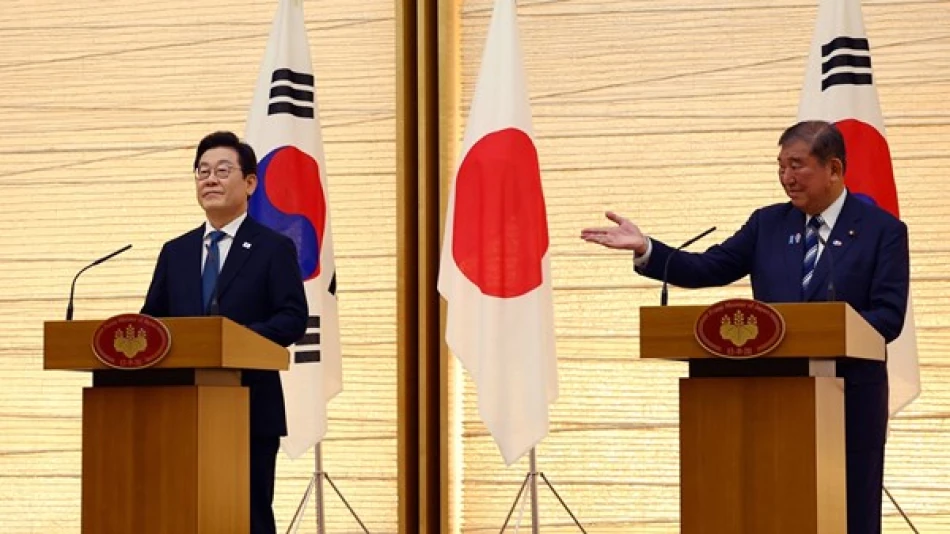
Japan and South Korea Agree to Strengthen Bilateral Ties: Deepening Economic and Political Cooperation
Japan and South Korea Forge Deeper Alliance as Trump Summit Looms
Japanese Prime Minister Shigeru Ishiba and South Korean President Lee Jae-myung agreed to strengthen security and economic ties during a crucial Tokyo meeting, positioning their nations for enhanced trilateral cooperation with the United States ahead of Lee's high-stakes summit with President Donald Trump on Monday. The diplomatic push signals both countries' recognition that regional security challenges demand closer coordination, particularly as North Korea's nuclear threats escalate and China's influence grows.
Strategic Timing of the Tokyo Meeting
Lee's first official visit to Japan since taking office in June comes at a pivotal moment for Northeast Asian geopolitics. The meeting with Ishiba at the Prime Minister's residence was deliberately scheduled before the Washington summit, allowing both leaders to present a united front to Trump while demonstrating their commitment to the trilateral security framework established by their predecessors.
"With the strategic environment surrounding our two countries becoming increasingly severe, the importance of our relationship and trilateral cooperation with the United States is growing," Ishiba stated in their joint declaration, underscoring the urgency both nations feel about regional threats.
Beyond Traditional Diplomacy: AI and Economic Security
The leaders' agreement extends far beyond conventional security cooperation, encompassing artificial intelligence, economic security, and expanded cultural exchanges including work-holiday programs. This comprehensive approach reflects how modern alliances must address technological competition and supply chain vulnerabilities alongside traditional military concerns.
North Korea's Nuclear Shadow
Both leaders committed to closer coordination against North Korea's nuclear and missile threats, a challenge that has only intensified since Pyongyang's recent weapons tests and deepening ties with Russia. The timing is particularly significant given North Korea's deployment of troops to support Russia's war in Ukraine, marking a dangerous escalation in regional security dynamics.
Preparing for Trump's Transactional Diplomacy
Lee's upcoming Washington meeting will likely focus on burden-sharing arrangements for U.S. troops stationed in South Korea, a perennial Trump priority. By securing Japanese support beforehand, Lee strengthens his negotiating position while demonstrating that regional allies are taking greater responsibility for their own security—a key Trump administration demand.
The trilateral framework provides both Japan and South Korea with leverage they wouldn't possess individually. Trump's previous presidency showed his preference for bilateral deals that often favored U.S. interests, making coordinated allied responses essential for maintaining favorable terms.
Historical Context and Future Implications
This diplomatic alignment represents a remarkable transformation in Japan-South Korea relations, which were severely strained just five years ago over historical grievances and trade disputes. The shift reflects both nations' recognition that geopolitical realities demand pragmatic cooperation over historical grudges.
Lee emphasized this strategic evolution, stating that robust Japan-South Korea relations would create "a virtuous cycle" strengthening trilateral cooperation. This approach mirrors successful alliance-building in other regions, such as the AUKUS partnership between Australia, the UK, and the United States, where shared strategic concerns override traditional hesitations.
Market and Economic Implications
Enhanced Japan-South Korea cooperation could unlock significant economic benefits, particularly in technology sectors where both nations are global leaders. Closer coordination on semiconductor supply chains, 5G networks, and AI development could help both countries maintain competitive advantages against Chinese technological advancement.
For investors, this diplomatic progress signals reduced geopolitical risk in Northeast Asia and potential opportunities in defense technology, cybersecurity, and advanced manufacturing sectors where Japanese and South Korean companies excel.
Most Viewed News

 Layla Al Mansoori
Layla Al Mansoori






